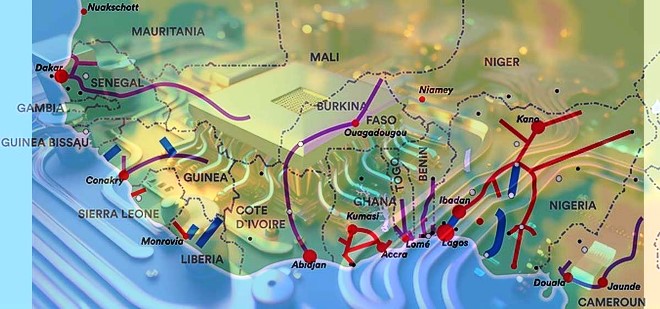By Engr. Gbolahan M.A. Alabi-Isama MS., Founder/CEO at Supercomafrica
Imagine a world where your most sensitive information – your medical records, financial transactions, even your daily commute patterns – is stored far away, beyond the reach of local laws and regulations. This isn’t science fiction, it’s the reality for many countries, including those across West Africa.
RELATED: Nigeria propels forward with relaunch of GEO-based NigcomSat 1R
But a tide is turning, fueled by a growing movement towards data sovereignty, and at its forefront sits a powerful tool: localized critical infrastructure.
Key Themes:
- Increased data security achieved through local storage and management will lead to safer online environments for citizens, particularly vulnerable groups like children, by mitigating cyber threats and harmful content.
- Enhanced access to and control over data will unlock economic opportunities for local entrepreneurs and researchers, enabling them to develop data-driven solutions for local challenges and drive innovation.
- Reduced reliance on foreign infrastructure will strengthen national security by diminishing vulnerabilities to cyberattacks and data breaches from external actors.
Think of data as the lifeblood of the digital age. It courses through our phones, computers, and servers, powering everything from online shopping to healthcare. But where this data is stored, and who has access to it, matters deeply. When critical infrastructure – the servers, cables, and networks that house this data – is located outside a country’s borders, it’s like entrusting your national treasure to a foreign bank. You lose control, accountability, and potentially, security.
This is why the European Union’s General Data Protection Regulation (GDPR) sparked a global conversation. It gave citizens unprecedented rights over their personal data and required companies to store it within the EU. Now, countries like India and Brazil are crafting similar laws, and the ripple effects are reaching West Africa.
Nigeria, a powerhouse of the region, is leading the charge. The Nigeria Data Protection Regulation (NDPR) echoes GDPR’s principles, demanding data privacy and security for its citizens. But implementing it fully requires a crucial step: localizing critical infrastructure.
Imagine This: instead of Nigerian data zipping across the globe to servers in distant lands, it’s housed securely within the country, accessible only under strict legal frameworks. This means faster internet speeds, improved data security, and, most importantly, data sovereignty. Nigerians will have a say in how their data is used, protected, and monetized.

Localizing critical infrastructure isn’t just about compliance, it’s about Empowerment. It unlocks a cascade of benefits:
- Boosted online safety: Local servers allow for better monitoring and filtering of harmful content, protecting vulnerable users, particularly children, from online predators and cyber threats. Just think of the potential impact in countries like Nigeria, where internet penetration is booming but online safety awareness lags behind.
- Enhanced innovation: With data closer to home, Nigerian entrepreneurs and researchers can develop data-driven solutions for local problems, from personalized healthcare to smart agriculture. This fosters a vibrant digital ecosystem that drives economic growth and social progress.
- Strengthened national security: Locating critical infrastructure within national borders reduces the risk of data breaches and cyberattacks from foreign actors, safeguarding sensitive information and protecting national interests.
The path towards data sovereignty isn’t without challenges. Building and maintaining robust local infrastructure requires significant investment, technical expertise, and collaboration across sectors. But the rewards are immense.
Here’s how Nigeria, and by extension, other West African countries, can turn the tide:
- Leverage Existing Infrastructure: The Internet Exchange Point of Nigeria (IXPN) serves as a crucial hub for data traffic within the country. Expanding its capacity and capabilities can be a springboard for localizing critical infrastructure.
- Invest in Skills Development: Building a workforce trained in cybersecurity, data management, and cloud computing is essential. Partnerships with universities and tech companies can bridge this gap.
- Foster Regional Cooperation: West African nations can collaborate on establishing shared data centers, harmonizing data protection laws, and creating a unified approach to online safety. Imagine a data-driven West Africa, where information flows freely and securely within the region, fostering innovation and prosperity.
Data sovereignty isn’t just a legal technicality; it’s a fundamental right in the digital age. By localizing critical infrastructure, Nigeria and other West African countries can reclaim control of their digital destiny, build a safer online space for their citizens, and unlock the transformative potential of data for generations to come. The journey towards data decolonization has begun, and it’s time for West Africa to take the lead.
Remember, the future of your data, and your nation’s digital future, is in your hands.
Additional Resources:
- Nigeria Data Protection Regulation (NDPR)
- Internet Exchange Point of Nigeria (IXPN)
- The Alliance for Affordable Internet (A4I)
Let’s work together to build a digital future where data empowers, not disempowers, and West Africa leads the way in a data-driven world.





























